13 Best Privacy Policy Examples To Check Out in 2026
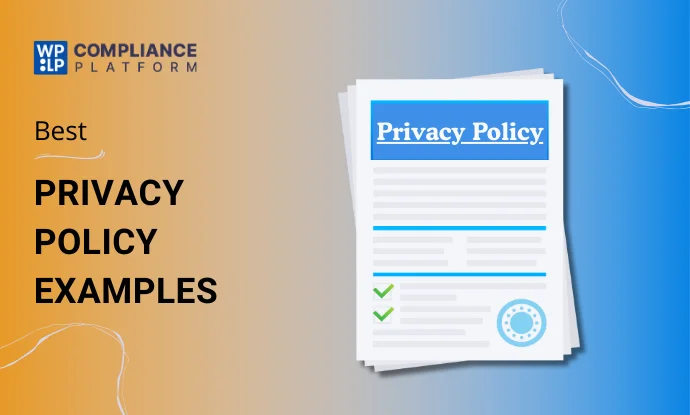
Summary
The article presents exemplary privacy policies from leading companies across various sectors, emphasizing the importance of transparency and user trust in privacy practices.
The article aims to guide businesses to develop effective privacy policies, highlighting tools like the WPLP Compliance Platform for regulatory compliance.
Struggling to draft a privacy policy for your website?
The privacy policy page is an essential document reflecting the behaviour and actions of a business to protect its user data.
It not only helps ensure data transparency but also helps you comply with global laws and avoid legislative challenges.
While you might wonder how to craft a privacy policy that meets all website needs, the examples of the best privacy policies can help you understand what to include.
This article will walk you through a few of the best privacy policy examples from operating businesses in different domains.
Read through the end, there’s a bonus for you!
- Top Privacy Policy Examples
- 1. Hubspot – SaaS Privacy Policy
- 2. Amazon – eCommerce Privacy Policy
- 3. Airbnb – Hospitality Privacy Policy
- 4. Meta – Social Media Privacy Policy
- 5. Udemy – Edtech Privacy Policy
- 6. Google – Search Engine Privacy Policy
- 7. Shopify – CMS Privacy Policy
- 8. Tesla – Automobile Privacy Policy
- 9. Adobe – Multimedia Privacy Policy
- 10. OpenAI – AI Privacy Policy
- 11. Uber – Mobility Services Privacy Policy
- 12. Zara – Fashion Lifestyle Privacy Policy
- 13. Netflix – Entertainment Privacy Policy
- How to Create a Privacy Policy for Your Website?
- What is the WPLP Compliance Platform?
- FAQ
- Conclusion
Top Privacy Policy Examples
Let’s now directly dive into how the best businesses in their sectors craft their privacy policy.
1. Hubspot – SaaS Privacy Policy
Hubspot is a popular name in the SaaS industry, offering a wide range of sales and marketing tools. The website records a vast base of daily customers, making it critical to ensure their data privacy.
Acting as a responsible business, the website underscores crucial essentials in its privacy policy for each stakeholder.
In an overview, they highlight detailed information about the following:
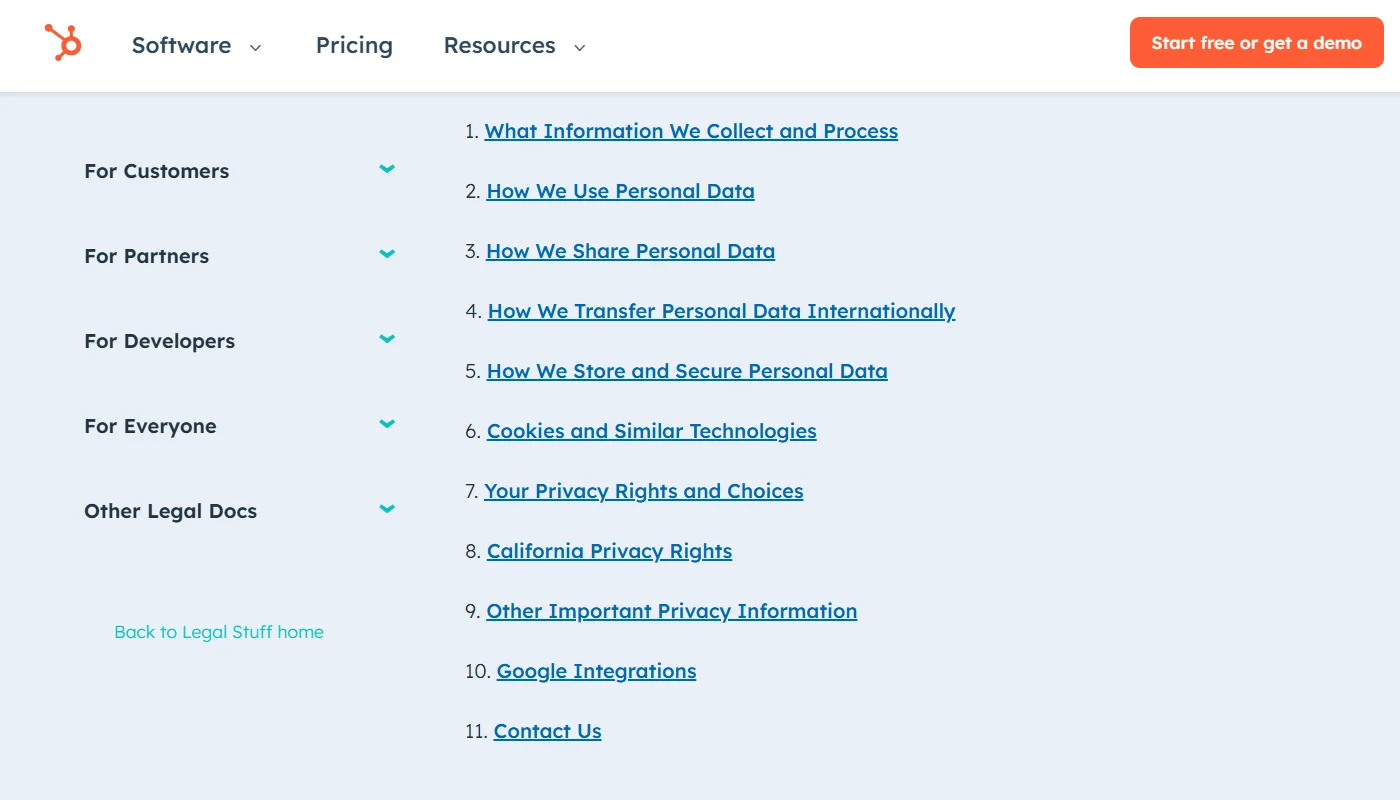
2. Amazon – eCommerce Privacy Policy
No matter which corner of the world you are in, when you think of eCommerce, it’s likely that Amazon is the first name that pops into your mind.
Moreover, it has become a search engine if you are looking for a product to purchase. If you are building an ecommerce brand, Amazon sets the best example that you should refer to. You can make a privacy policy like Amazon using the Free WP Legal Pages plugin.
The privacy policy of Amazon covers:

3. Airbnb – Hospitality Privacy Policy
Globally dominant hospitality business Airbnb always remains a trendy search option when one looks for a place to stay worldwide.
While they attract a huge base of website visitors, they are also dedicated to user data privacy and safety.
In its privacy policy, Airbnb highlights:

4. Meta – Social Media Privacy Policy
Meta Platform, across its range of social media apps, currently hosts over 3.43 billion daily active users. With such a huge user base, Meta has frequently been accused of wrongfully acquiring and using users’ data.
While the accusations appear differently occasionally, Meta has always tried to position itself as a strong practitioner of data privacy principles. In its privacy policy, Meta highlights:

5. Udemy – Edtech Privacy Policy
Udemy has become a popular internet choice for modern-day schooling, hosting over 200k courses on various topics.
Users often access the platform to pursue these courses, some free and some paid. While logging in, the platform records your details for email and promotional marketing. Due to which, Udemy also follows a strict privacy policy, highlighting:

6. Google – Search Engine Privacy Policy
With the increasing internet use, if any business has benefited the most, then it’s Google. Recording millions of searches every minute, the search engine collects a lot of data when users use their platform.
While the recorded user data is used for a variety of purposes, Google, in its privacy policy, clearly states about every aspect of its usage and safety:

7. Shopify – CMS Privacy Policy
Well-known for creating eCommerce sites, Shopify acts as one of the best content management systems.
While its ease of use is among its prime USP, users provide a lot of personal and detailed information, the security of which is crucial. Shopify’s privacy policy clearly specifies how it ensures the safety of that data.
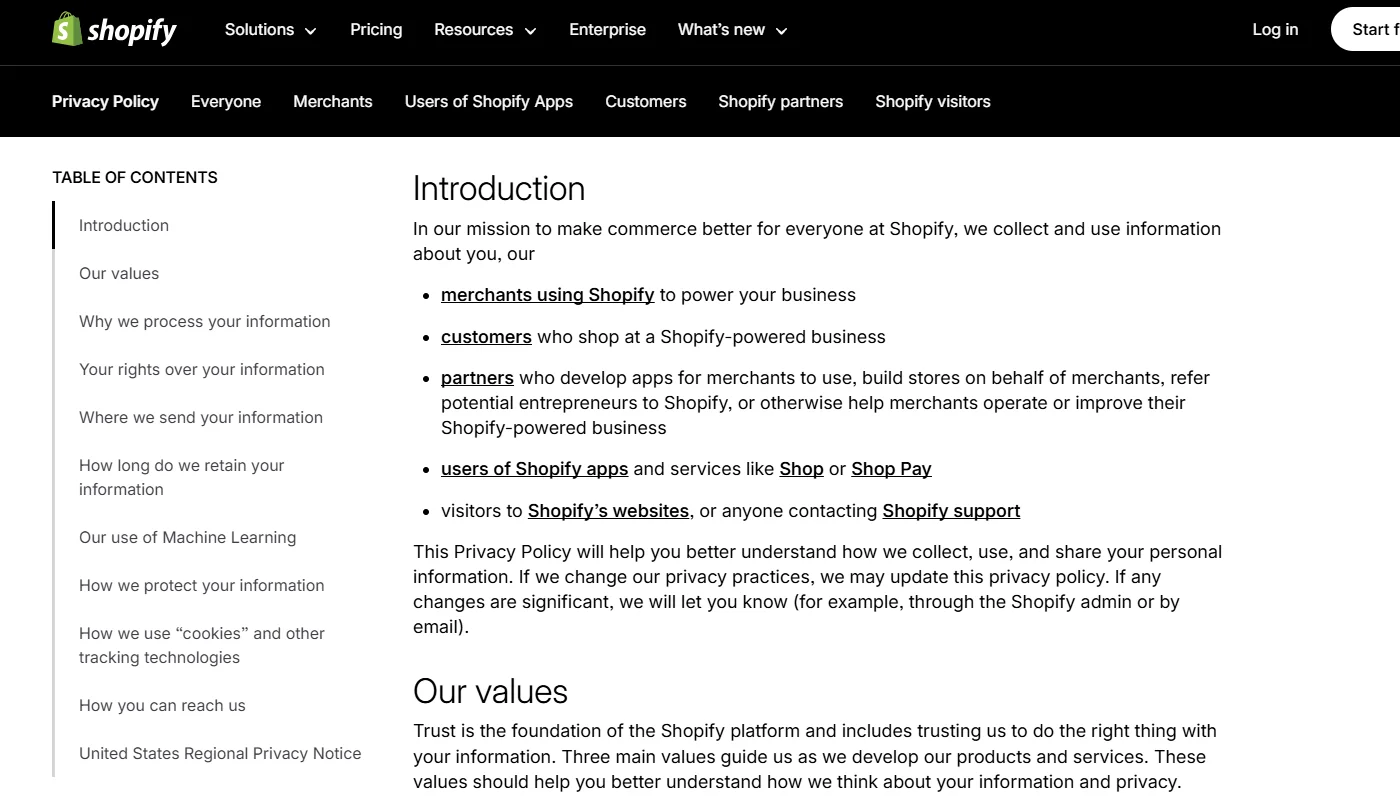
8. Tesla – Automobile Privacy Policy
Well-established automobile brand Tesla also focuses on offering its users the best, for which it records user data.
However, to ensure data transparency and safety, Tesla has drafted a stringent privacy policy to ensure the safety of the user data it collects. It highlights:

9. Adobe – Multimedia Privacy Policy
If you are working in the creative, marketing, and photo editing industry, Adobe is a popular name that you surely must have come across.
Undoubtedly, the business offers a range of products used and trusted by millions of users, while non-users also often register on the platform to try their products.
To safeguard the privacy of its users’ data, Adobe also complies with the legal requirements underscoring its data privacy principles:
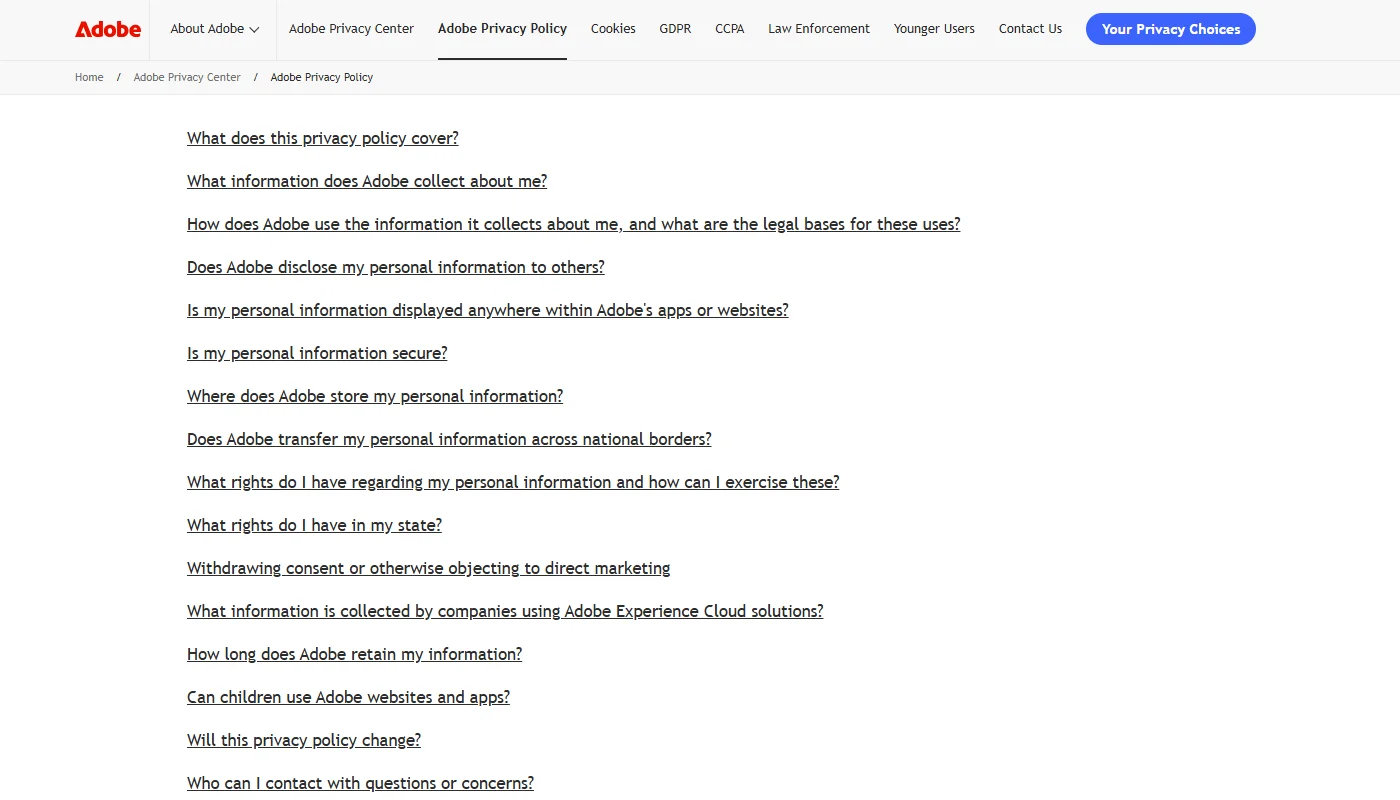
10. OpenAI – AI Privacy Policy
Since its star product “ChatGPT” in December 2022, the brand has almost been used as an alternative term for AI, specifically AI chatbots.
It not only answers all your questions, but the current version also has the potential to summarize and analyze all previous discussions and much more than your thoughts.
However, such potential of any software requires a significant amount of users’ data records. While the privacy challenges with such AI developments have always been questioned occasionally, ChatGPT clearly outlines these queries in terms of privacy.
While the privacy policy of OpenAI is very broadly explained on the website, you may refer to this summarized version:

11. Uber – Mobility Services Privacy Policy
Popular across the globe for offering mobility services, Uber has become a common name for cab booking services.
While users visit Uber’s website, it requires them to provide a few details and store other data based on their actions on the website and other things. Uber clarifies the terms of the data privacy of these recorded data in their privacy policy, briefly stated as below:

12. Zara – Fashion Lifestyle Privacy Policy
Zara, these days, has almost become a common and one of the most preferred fast fashion and lifestyle brands, especially for Gen Z users.
While users visit the Zara website quite often, it stores and records their data to use it for various purposes. The brand clearly states the use of the data in its privacy policy:
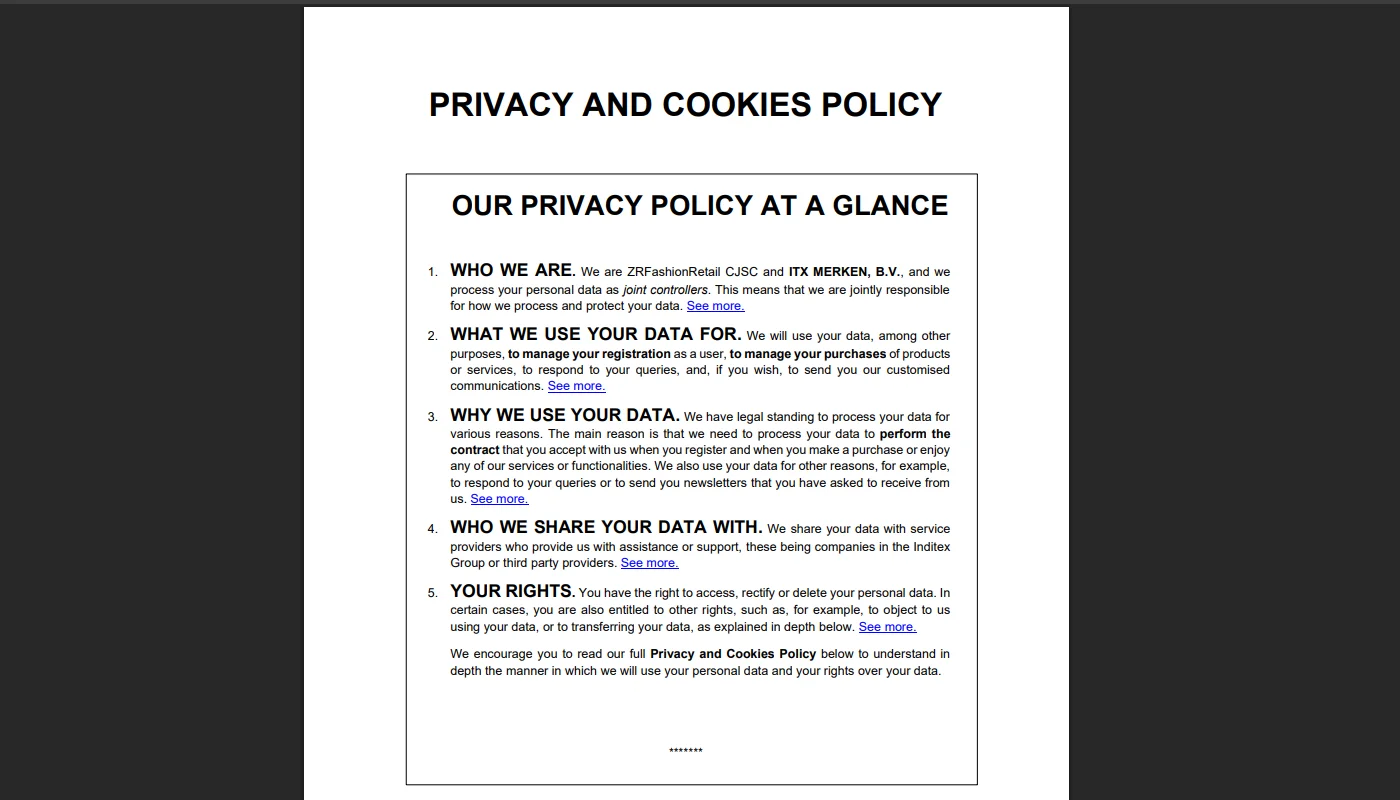
13. Netflix – Entertainment Privacy Policy
Netflix is probably one of the most commonly heard names in the entertainment industry today, with millions of users visiting their website daily.
Similar to other websites, Netflix tracks user data when they land on their website and clearly ensures its use and safety in their privacy policy.
Here’s an overview of what’s covered in their privacy policy:
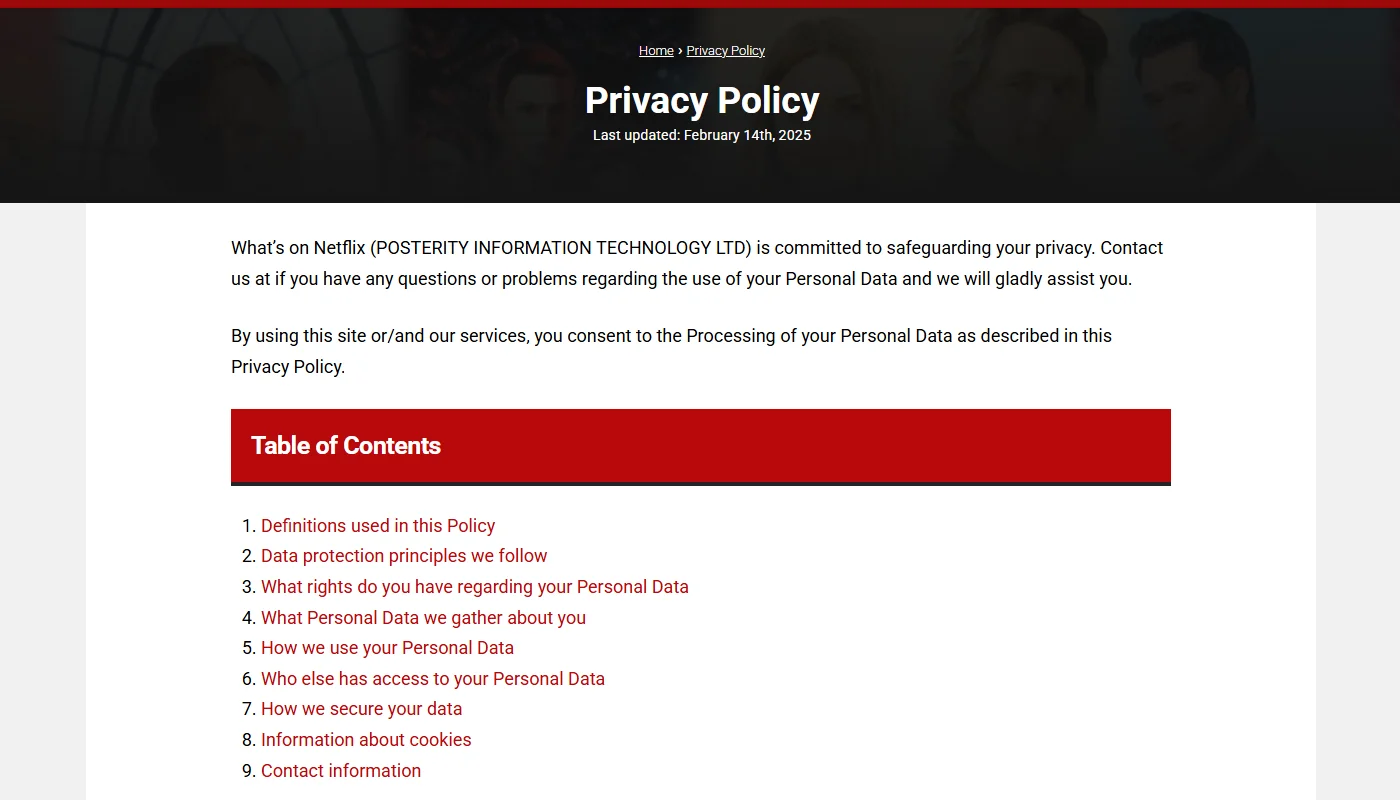
How to Create a Privacy Policy for Your Website?
While there are various ways to create a privacy policy for your website, the three most standard ways and commonly preferred methods include:
- Self-Drafting A Privacy Policy Page
- Hiring A Legal Professional
- Using A Privacy Policy Generator
Each of these methods offers its benefits and challenges.
While self-drafting a legal page is inexpensive, it requires you to have sound knowledge of legal terms; however, if you plan to use AI bots while self-drafting, that is a whole different aspect on why you should not, which we have covered in our guide:
AI-Generated Privacy Policy: Are They Harming Your Website?
On the other hand, while hiring a legal professional can help you avoid learning legal technicalities, it’s costly, costing you a one-time drafting fee of more than $1000. Alongside, if there are specific changes in the laws, the average lawyer fees for privacy policy review go to at least $700.
In my opinion, using a privacy policy generator is the best method to draft a privacy policy for your website. They are basically easy-to-use tools that allow you to input information about your website or app and automatically generate a privacy policy document tailored to your specific data practices and legal requirements.
These generators typically walk you through a series of questionnaires. Based on your answers, the privacy policy generator drafts an appropriate privacy policy language and clauses.
While various privacy policy generators are available online, based on my experience, I found the WPLP Compliance platform provides the best solutions, mainly to WordPress users.
What is the WPLP Compliance Platform?

WPLP Compliance Platform is a robust set of two powerful plugins that help you fulfil all essential requirements, integrated within your website, that comply with global laws, including GDPR, CCPA, and others.
The plugins offered in the compliance platform are:
WP Legal Pages
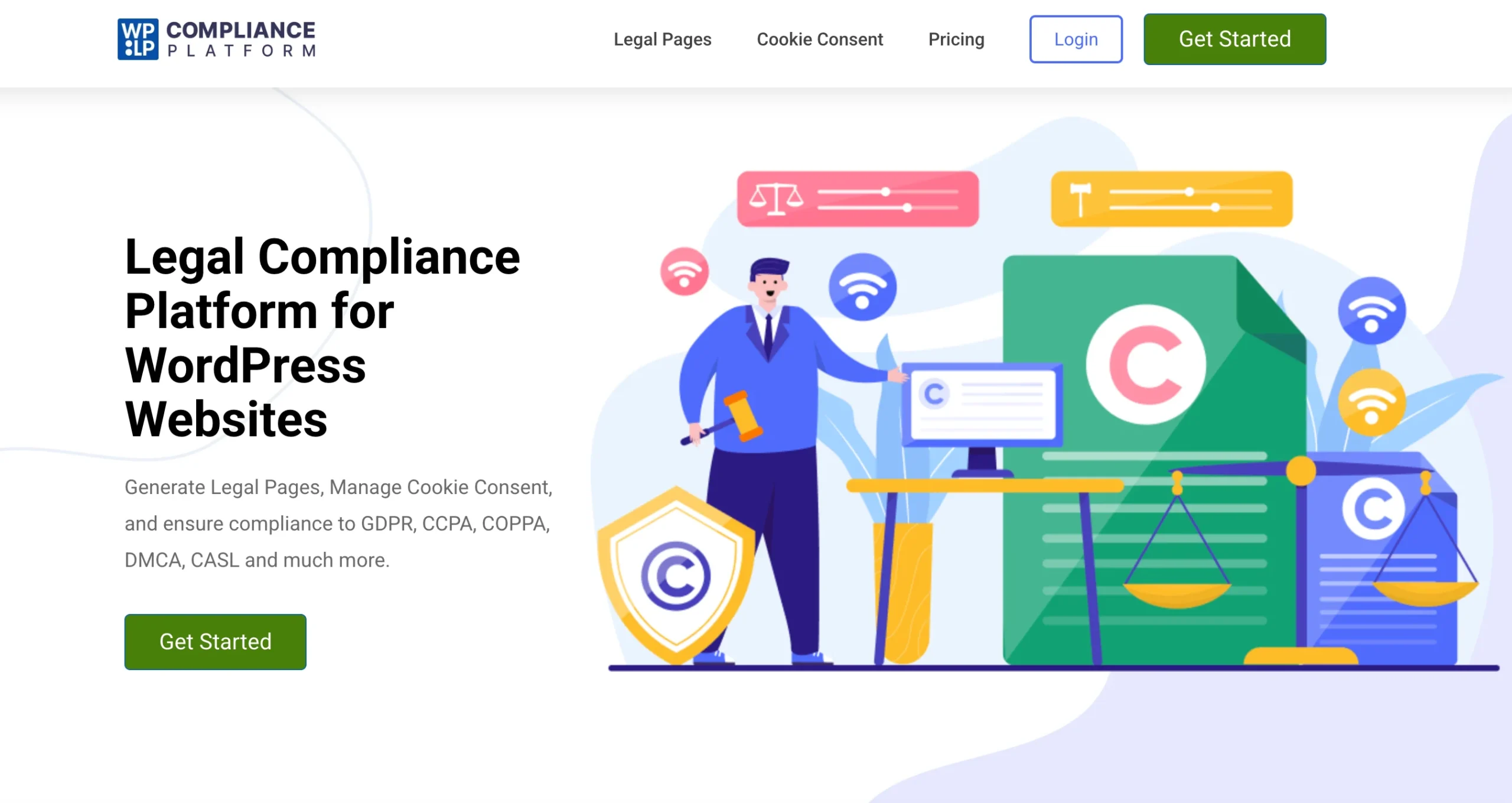
WP Legal Pages helps you generate legal pages for your website that adhere to global laws.
It boasts a library of over 35 essential legal pages, including a free privacy policy that users can create using their intuitive wizard.
Moreover, the plugin has a user-friendly interface, multi-language support, and many customization options in the legal page templates.
To learn how to create a privacy policy with the plugin, refer to:
Next, let’s check out the other plugin, WP Cookie Consent.
WP Cookie Consent
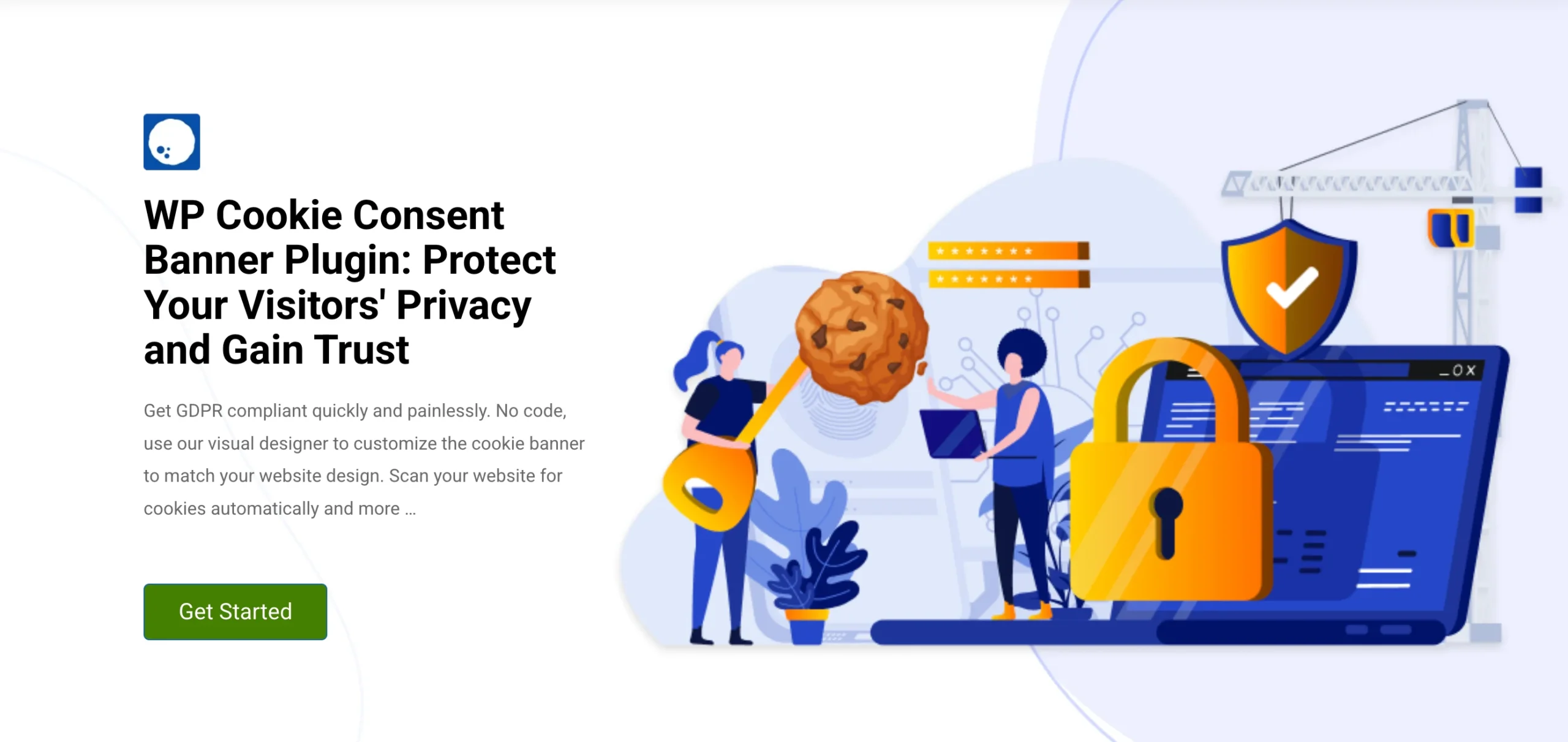
WP Cookie Consent, on the other hand, helps users quickly create cookie notices for their website that comply with data privacy regulations. It enables them to obtain user consent for cookies before placing them on visitors’ devices.
The plugin helps your business stay compliant with legal requirements and provides business owners with insights and analytics of user behaviour.
FAQ
A privacy policy should detail data collection practices, data usage, data sharing, user rights, and security measures. It must also specify how users can manage their information and comply with legal requirements.
Yes, you can create your privacy policy. However, ensuring it meets legal standards and accurately reflects your data practices is essential. Using templates from WP Legal Pages Compliance Platform or consulting legal resources can help.
Free privacy policies can be legitimate but may lack specificity and regulatory compliance. Reviewing and customizing free templates to suit your business needs and local laws is crucial.
Yes, there are free privacy policy generators available online, like the WPLP Compliance platform. It helps you create a basic policy but tailor it to your specific data practices and legal obligations.
Conclusion
The privacy policy is an essential document that must be shown on your website from the day you create it.
Although the process of drafting such a legal document for your website might appear complex, privacy policy generators like WP Legal Pages simplify it for you.
Further, if you liked this article, also consider reading:
